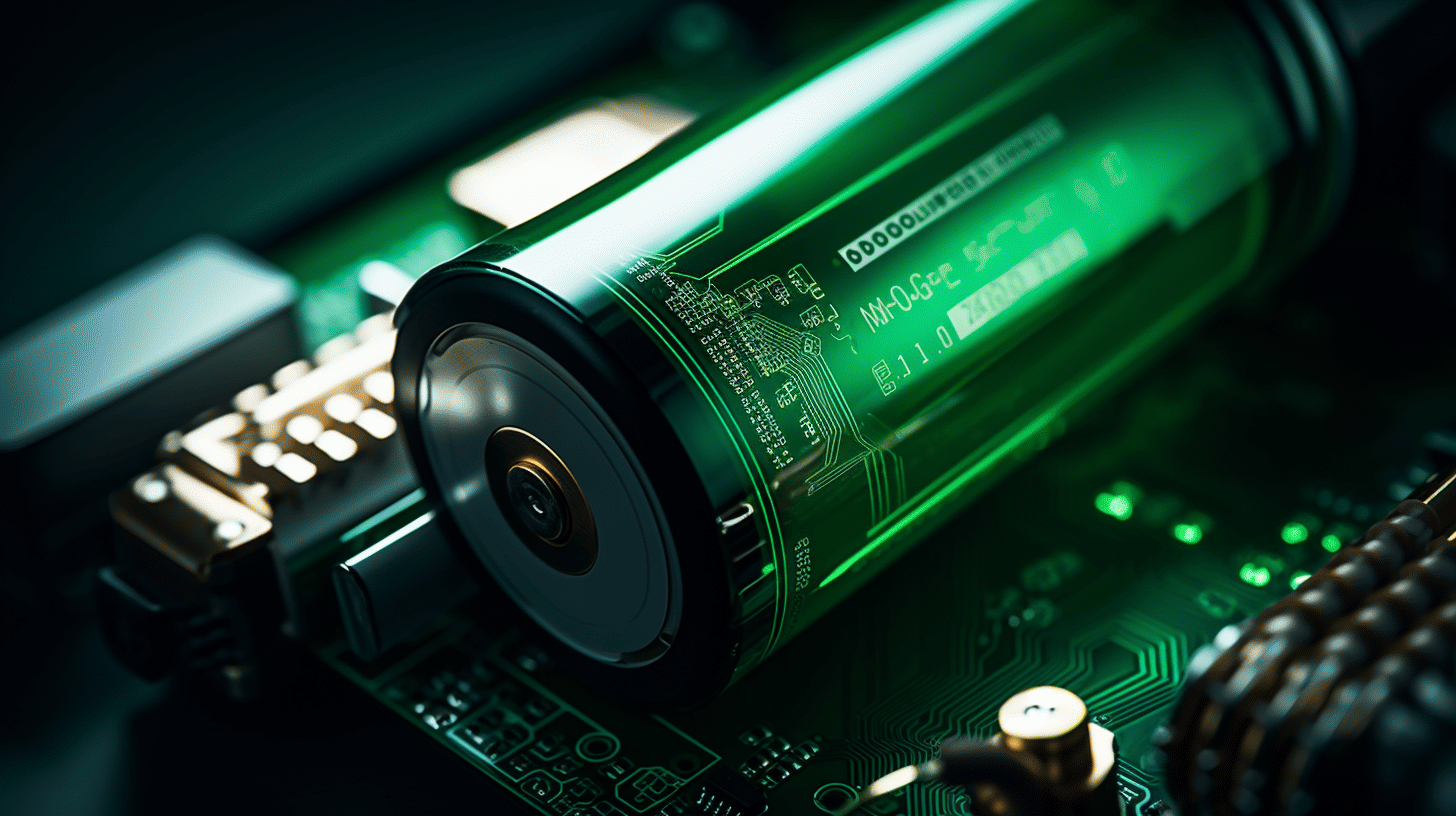A Guide to Supercapacitors for UPS
Imagine the chaos that ensues when there's an unexpected downtime in a data centre or a sudden power outage in a hospital. Even a few seconds of interrupted power could lead to devastating consequences. To address these high stakes situations, Uninterruptible Power Supply (UPS) systems serve as an invisible hero, providing immediate power when our reliable electricity betrays us. Traditionally, these systems have used batteries as an immediate source of power. However, technological advancements have seen a rise in the use of supercapacitors.
This article delves into the fascinating world of supercapacitors for UPS systems, from understanding their basics to appreciating their unique advantages. We will explore the various types of supercapacitors, discuss their applications in different sectors, and put them head-to-head with traditional battery-based UPS systems. We will also look at the challenges along the path to supercapacitor adoption before predicting exciting future developments in this branch of technology. So get ready for a deep dive into the dynamic world of supercapacitors and their role in powering our electricity-dependent planet.

What are Supercapacitors?
Supercapacitors, also known as ultracapacitors or electrochemical capacitors, are unique power storage devices that surge past traditional batteries in some significant aspects. Fundamentally, they are impressive energy reservoirs bridging the gap between conventional capacitors and rechargeable batteries. They blend the high energy storage capacity of a battery with the instant charge-discharge capabilities of a capacitor, offering an astounding amalgamation of performance characteristics.
Considering that batteries reign supreme when it comes to longevity, how do supercapacitors stack up? In a head-to-head battle, what sets supercapacitors apart lies in their appreciable rapid charge-discharge ability and long lifecycle.
Here's how they measure up to traditional batteries:
- Charge/Discharge Speed: While batteries need time to trickle-charge gradually, supercapacitors can be charged almost instantaneously and deliver massive blasts of power in a short span of time.
- Lifespan: Unlike regular batteries that lose their efficiency after a few hundred charge cycles, supercapacitors can endure millions of charge-discharge cycles without any notable degradation.
- Temperature Tolerance: Hold on to your hats because supercapacitors can operate effectively in a wider range of temperatures, maintaining their performance even in extreme conditions where batteries may falter.
- Energy vs. Power: Batteries store large amounts of energy but can't deliver high power, contrasting supercapacitors which can unleash massive power but store less energy.
Indeed, by encapsulating the best of both worlds – the rapid power delivery of capacitors and the substantial energy storage of batteries – supercapacitors hold a bright promise for the future of energy storage systems.
Embracing this appreciable tipping of scales, it's evident that supercapacitors could very well be the next game-changer in energy technology, steering us towards a more sustainable and efficient power generation era.
Advantages of Supercapacitors in UPS Systems
Our world today is more intertwined with technology than ever before. As we grow more dependent on devices for work, entertainment, and daily communication, the stability of these electronics becomes paramount. This has made Uninterruptible Power Supply (UPS) systems, which ensure reliable power supply during power outages or fluctuations, an irreplaceable asset. Supercapacitors form the backbone of these systems, proving to be key in providing a slew of advantages. Let's dissect these benefits one by one.
Fast Charging and Discharging
One of the most significant advantages of supercapacitors in UPS systems is their capacity for rapid charging and discharging. Unlike lead-acid batteries, which often require hours to fully charge, supercapacitors can attain their maximum charge within mere seconds. This quick charging ability is crucial during power outages when every second counts.
- They ensure that UPS systems are ready to switch on very quickly when power gets interrupted.
- Fast discharging ability allows for instant kick-in of power during blackouts.
Extended Lifespan
Every electronic device has a limited lifespan, and the same applies to the components within them. However, supercapacitors ensure that this lifespan is significantly extended. Capable of withstanding a high number of charge and discharge cycles, supercapacitors rarely degrade over use.
- This gives them a life expectancy that far surpasses most batteries used in UPS systems.
- It saves money in the long run as the need for regular replacements is curtailed.
High Power Density
Power density - the amount of power a system can deliver for a given weight - is another area where supercapacitors shine. They provide a high power density which is crucial in situations where space and weight are limitations.
- Supercapacitors can deliver the necessary power without taking up a large space or adding substantial weight to the UPS system.
- This is particularly essential in environments where space is at a premium, such as data centres and server rooms.
Reliability and Maintenance
Supercapacitors enhance the reliability of UPS systems and simplify their maintenance. Unlike conventional batteries, they operate well in a wide range of temperatures and environments. Their function isn't significantly impaired by extreme heat or cold, and they can operate effectively over a broader temperature range.
- This means UPS systems equipped with supercapacitors require less maintenance, fewer replacements and, subsequently, lower operating costs.
- Enhanced reliability ensures that the risk of system failure is greatly reduced, providing peace of mind for users.
As we have explored, the use of supercapacitors in UPS systems presents a myriad of benefits. From fast charging and discharging, extended lifespan, high power density to reliability and easy maintenance, they are set not just to improve UPS systems but to redefine their performance capabilities altogether. They represent an invaluable component that continues to drive innovation in the realm of UPS technology.
Supercapacitor Types for UPS Systems
Uninterruptible Power Supply (UPS) systems are pivotal in ensuring the consistent availability of power—especially in mission-critical environments. As the backbone of these systems, supercapacitors play an essential role thanks to their superior ability to offer instant power during power interruptions or drops. However, not all supercapacitors are created equal. Let's delve into three primary types employed in UPS systems: Graphene-based supercapacitors, Carbon Nanotube supercapacitors, and Hybrid supercapacitors.
Graphene-based Supercapacitors
What sets graphene-based supercapacitors apart is the impressive surface-to-size ratio of graphene. A single gram of graphene has a surface area of about 2,675m²—roughly the size of a soccer field. This vast surface area translates into an exceedingly high energy storage capacity, making these supercapacitors ideal for heavy-duty, high-demand UPS systems.
Carbon Nanotube Supercapacitors
Carbon Nanotube supercapacitors come mounted with cylinders of carbon atoms—known as nanotubes—which are just a billionth of a meter in diameter. These minuscule structures offer exceptional electrical conductivity—an invaluable attribute that results in rapid energy storage and release. They're primarily suited to UPS systems that necessitate swift power restoration during sudden outages.
Hybrid Supercapacitors
Hybrid supercapacitors represent a marriage of the best capabilities of traditional electrolytic capacitors and rechargeable batteries. They effectively combine the high energy storage of batteries with the rapid charge and discharge rates of electrolytic capacitors. This unique blend makes them a top choice for UPS systems in fluctuating power environments.
Different supercapacitors indeed come with their unique strengths, and the choice boils down to the specific needs of a given UPS system. Be it the unmatched energy storage of Graphene-based supercapacitors, the swift energy transfer of Carbon Nanotube supercapacitors, or the best-of-both-worlds approach of Hybrid supercapacitors, a keen understanding of these types can help optimise the performance of UPS systems tremendously.
Applications of Supercapacitor-based UPS Systems
If there's one thing that we can all agree on in this digital age, it's that maintaining a constant and reliable power supply to critical systems is crucial. Uninterruptible Power Supplies (UPS) come in handy at these moments, especially when armed with supercapacitors. In this post, we'll delve into some of the applications of supercapacitor-based UPS systems.
Telecommunications
The resilience of telecommunication systems is undoubtedly essential. Imagine a situation where there's an unexpected power loss, and urgent communication protocols are in place, a situation that is hardly ideal. This is where supercapacitor-based UPS systems are a game-changer. They ensure that, in the event of a power disruption, the telecommunications systems continue to operate seamlessly, preventing any communication breakdown.
Data Centres
In the sophisticated world of data centres, an uninterrupted power supply is non-negotiable. Sudden power loss can lead to catastrophic data loss and irreversible damage to sensitive equipment. Supercapacitor-based UPS systems provide instant power backup, ensuring the secure operation of servers and storage devices.
Medical Facilities
Every second count in the world of health care, and an unexpected power disruption, can literally mean a matter of life and death. Supercapacitor-based UPS systems prove invaluable in these situations, providing critical power supply for sophisticated machines that can maintain the life of a patient.
Industrial Plants
Just like medical facilities, industrial plants also heavily rely on uninterrupted power supplies. A sudden loss in power supply can lead to significant downtime, causing loss of productivity. Supercapacitor-based UPS systems ensure continued operation of vital machinery, thereby eliminating unnecessary stoppages and maintaining optimum productivity levels.
Transportation
Last but not least, is the transportation sector. Modern transport systems like urban electric rails or electric buses rely on a constant power supply for their operations. If a power failure were to happen during rush hour, it would definitely lead to chaos. That's where the Supercapacitor-based UPS systems come in. They kick in instantaneously in the event of a power failure, ensuring uninterrupted operation.
In summary, the applications of supercapacitor-based Uninterruptible Power Supply systems are numerous and varied. They play a pivotal role in ensuring that crucial operations across various sectors are not hampered by sudden power losses. These UPS systems are here to stay and will undoubtedly continue to be a staple in many sectors, ensuring a seamless, uninterrupted power supply.
Comparison to Battery-based UPS Systems
Supercapacitor-based UPS systems and battery-based UPS systems have both marked their territories in the power storage domain, significantly shaping our ability to ensure consistent energy delivery. However, each system bears its own unique strengths and limitations, leaving enterprises to weigh their options depending on their specific needs.
A closer look at the two technologies can shed light on their utility and applicability in varied scenarios. Supercapacitor-based UPS systems are often celebrated for their high power density, remarkable charging speed, and commendable lifespan. These qualities make them the go-to for applications demanding rapid charge/discharge cycles and longevity. For instance, in data centres where power consistency is paramount and interruptions can incur colossal losses, supercapacitors prove a boon with their quick replenishment capabilities and reliable life-cycle.
Battery-based UPS Systems: An Old Friend?
Battery-based UPS systems, on the other hand, are solid performers that have stood the test of time. Familiarity has bred trust, and their proven ability to deliver sustained power over more extended periods gives them merit, especially in load shedding and peak shaving applications. Moreover, their lower upfront costs and wide range of options adapt to diverse budget and space constraints.
Still, one cannot ignore their not-so-fin-facts:
- Their lifespan typically falls short in comparison to their supercapacitor counterparts.
- They mandate frequent maintenance checks, adding to the operational overhead.
- Their disposal poses environmental concerns, leading to potential regulatory barbs.
Weighing the Scales
In light of these factors, choosing between a supercapacitor-based UPS system and a battery-based one isn't stark black and white. It becomes a balancing act between factors such as capacity requirements, budget constraints, operational overhead, and sustainability goals.
Examining the data, it's clear that, while battery-based UPS systems continue to hold their ground on some fronts, supercapacitors are steadily gaining traction with their unique advantages. However, striking the right balance often involves a hybrid approach, harnessing the strengths of both technologies.
In essence, there isn't a one-size-fits-all solution in this arena. The optimal choice responds to an organisation's unique energy needs, operational dynamics, and environmental commitments. Professionals seeking deeper insights into this topic can consider additional data on the comparison of supercapacitor-based UPS systems with battery-based UPS systems to make an informed decision.
Limitations and Challenges of Supercapacitors in UPS Systems
Although supercapacitors offer a promising solution for Uninterruptible Power Supply (UPS) systems due to their high power density and rapid charging capabilities, certain limitations and challenges can hinder their widespread adoption. This section aims to illuminate the key constraints inherent to supercapacitors, which include limited energy storage capacity, temperature sensitivity, and cost.
Limited Energy Storage Capacity
With the ability to deliver quick discharges of power, supercapacitors shine in applications where brief but substantial bursts of energy are needed. Yet there's a flip side—supercapacitors store significantly less energy than their battery counterparts. Hence, their use in a UPS system might mean shorter uptime during a power outage, compromising the system's ability to provide an adequate buffer of backup power.
Temperature Sensitivity
Temperature greatly influences the performance of supercapacitors. When exposed to high temperatures, they play out their strengths, delivering optimal performance. However, when the temperature drops, their capacity to hold a charge diminishes significantly. Thus, the effectiveness of a supercapacitor-powered UPS will literally hinge on whether they 'feel hot or cold' – an evident challenge in environments with fluctuating temperatures.
Cost
A pivotal factor that cannot be ignored when considering supercapacitors for UPS systems is cost. As of now, the upfront cost of supercapacitors is notably higher than conventional batteries. For businesses operating on thin margins or those reluctant to invest heavily in backup power, the price tag of supercapacitors may deter them from taking the plunge.
Through understanding these limitations and challenges, the future planning of UPS systems incorporating supercapacitors can be optimised. While they exude potential, it's crucial to recognise that, like any technology, supercapacitors aren't perfect and must be utilised in situations best suited to their capabilities.
Future Developments and Trends in Supercapacitor Technology
The realm of supercapacitor technology is bustling with fascinating advancements set to reshape how we perceive energy storage and distribution of UPS systems. Technological advancements equipped with breakthrough research are envisaging a future where supercapacitors may very well gain a significant edge over traditional batteries. These notable developments will probably revolutionise energy storage capacity, temperature stability, and cost-effectiveness, significantly amplifying the efficiency and reliability of these vital technological components.
Increased Energy Storage Capacity
One of the most anticipated directions for the evolution of supercapacitor technology lies in the pursuit of higher energy storage capacity. Resultant of diligent research efforts to re-engineer the design and the materials that supercapacitors are built with, we are on the brink of introducing supercapacitors that can store more energy without an increase in size or weight. This will undoubtedly create a sizable impact, enhancing the capabilities of devices and equipment that we use daily, and transforming them into more energy-efficient, durable units.
Enhanced Temperature Stability
Maintaining operational efficiency while navigating extreme temperatures has always posed a challenge for energy storage devices. However, the dynamic realm of supercapacitor technology is poised to make significant strides towards achieving enhanced temperature stability. Pioneering materials and innovative designs are underway, focusing on creating supercapacitors that promise exceptional temperature resistance while maintaining their efficiency, even under severe weather conditions. This development is bound to enable supercapacitors to conquer new frontiers, specifically in environments known for their temperature extremes.
Reduced Cost
Overcoming cost hurdles is an essential consideration in the future development of supercapacitor technology. By facilitating large-scale production and implementing innovative practices, industry experts predict a sharp reduction in the manufacturing costs of supercapacitors. This will effectively transform them into a more financially viable solution for wide-scale applications. Resulting from these improvements, supercapacitors will probably become an even more attractive alternative for energy storage, posing as both an economical and efficient option for a range of industries.
As we look to the future, these developments in supercapacitor technology represent significant promise in the continuous quest for energy efficiency, sustainability, and affordability. The relentless thirst for innovation in the domain of energy storage ensures that supercapacitors will surely play a pivotal role in powering the technologies of tomorrow.
Conclusion
In a world where power supply consistency is imperative for business continuity, the importance of unfailing UPS systems cannot be overstated. Supercapacitors, with their swift charging/discharging, long life span, high power density, and reliable performance, have revolutionised the UPS space, bringing immense value to sectors like telecommunications, data centres, medical facilities, industrial plants, and transportation.
However, while supercapacitors present compelling benefits, their limitations—limited energy storage, temperature sensitivity, and high cost—highlight the need for further research and development. Anticipated future enhancements in energy storage capacity, temperature stability, and more affordable manufacturing processes suggest a bright future for supercapacitor technology in UPS systems.
At Secure Power, we are committed to staying abreast of these technological advances. Our experience and relationships with top manufacturers enable us to offer our clients cutting-edge, reliable, and cost-effective power protection solutions, characteristic of the evolution witnessed with supercapacitors. We will continue to deliver tailored power protection plans and high-quality maintenance services, ensuring the longevity and optimal performance of your UPS systems. For more information, visit us at Secure Power. We are excited to help you navigate the world of UPS systems and find the perfect solution to your business needs.
Frequently Asked Questions
-
What is a supercapacitor and how does it work in UPS systems?
A supercapacitor is an energy storage device that stores electrical energy via electrostatic charge separation. In UPS systems, supercapacitors provide short-term power backup during power outages or voltage fluctuations, ensuring uninterrupted power supply.
-
What are the advantages of using supercapacitors in UPS systems?
Supercapacitors offer several advantages in UPS systems, including high power density, fast charging and discharging capability, long lifespan, wide operational temperature range, and high reliability compared to traditional battery-based systems.
-
How do supercapacitors differ from batteries in UPS systems?
Unlike batteries, supercapacitors can charge and discharge rapidly, providing quick bursts of power. They have a longer lifespan, require less maintenance, and are more resistant to extreme temperatures. However, supercapacitors have lower energy density and cannot store as much energy as batteries.
-
Can supercapacitors completely replace batteries in UPS systems?
While supercapacitors have their advantages, they cannot completely replace batteries in UPS systems. Supercapacitors are best suited for short-term power backup and bridging power gaps during generator startup or grid switchover. Batteries are still necessary for long-term power backup.
-
Are there any limitations or considerations when using supercapacitors in UPS systems?
It's important to consider the power requirements of your UPS system as supercapacitors have lower energy storage capacity compared to batteries. Additionally, supercapacitors may be more expensive upfront, but their long lifespan and low maintenance costs can offset this. Consulting with an expert is recommended for proper integration and sizing of supercapacitors in UPS systems.














